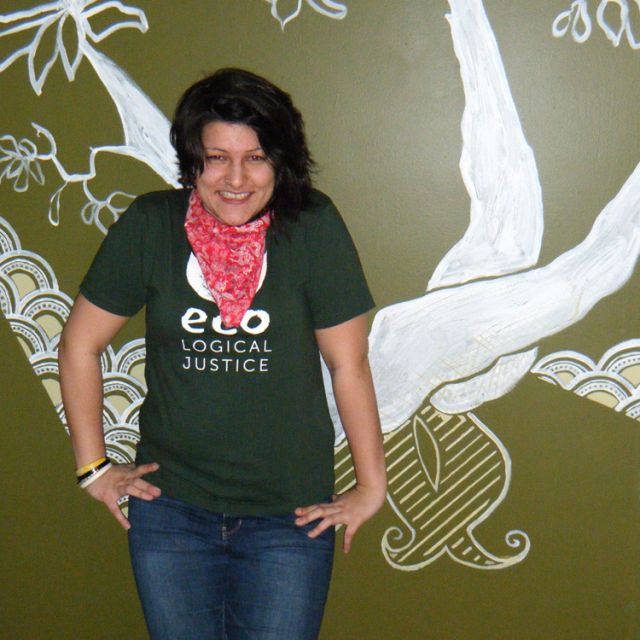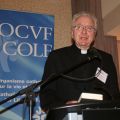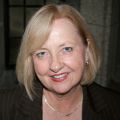A week without solid food isn’t going to fill the $5-million hole in the Canadian Catholic Organization for Development and Peace’s budget, but Kaitlyn Duthie-Kannikkatt felt she had to take on a Holy Week fast to protest CIDA cuts to the Catholic movement.
The 22-year-old Carleton University student lived on nothing but tea, water and juice until Easter Sunday even while working on her graduating thesis in the global politics program. By mid-week her protest had raised almost $1,400 for D&P.
“The fact that these cuts took place, or we heard tell of them, during Lent is really telling,” Kannikkatt told The Catholic Register. “Being that time of year, it provided an opportunity for the (D&P) membership across the country to get in touch with this issue in a more spiritual and connected way.”
On Good Friday, Kannikkatt was joined on her fast by almost 300 people who vowed to dedicate their fast to D&P. They will give money they would otherwise have spent on food to the Canadian bishops’ development agency while also writing letters to the government to protest a 65-per-cent cut in CIDA funding for 2011 to 2016.
The member actions have inspired the agency’s 60-plus employees, said D&P program co-ordinator Siobhan Rowan.
“It’s been quite incredible and very heartening,” Rowan said. “And it makes it all the harder to think of what we’re going to lose.”
Kannikkatt has written letters to Prime Minister Stephen Harper and International Co-operation Minister Bev Oda asking for reasons behind the funding cut, but has yet to receive a reply.
“Fasting throughout the centuries has been used as a really powerful means of resistance,” said Kannikkatt.
Citing Indian leader Mohandas Gandhi, Kannikkatt doesn’t believe fasting can be easily classified as either political or spiritual.
“Hundreds of members across the country are going to be joining me in this fast,” she said.
“Fasting together, in solidarity with each other, I think that is an incredible example of the Spirit moving through the people involved in this organization as well as making a powerful statement about the politics behind it.”
Kannikkatt’s final paper is about how a corporate social responsibility program run by a Canadian mining company in Guatemala is affecting development prospects for the local community. After graduation she is travelling with a D&P delegation to the Rio+20 United Nations conference in June.
The idea that the current government is more interested in charity than justice, more interested in corporate image repair than democratic change has the employees of D&P calling for action to confront the Conservatives on their development policy, said Rowan.
There’s no way of knowing precisely how many people working with HIV-positive slum dwellers in Africa or helping poor farmers in Haiti are about to lose their jobs because D&P funding has dried up, said Rowan. In many cases laying off the workers in partner organizations will dismantle years of patient, slow work and throw skilled people on the street in countries with no social safety net, she said.
In Ottawa, Kannikkatt isn’t complaining about hunger pangs. She’s thinking about the future of the movement.
“It means we’re going to have to start seeing how we can work differently with our allied organizations in the ecumenical world and in the secular world — see how we can combine our efforts a little bit more,” she said.
“Also we have to see how we can speak out with a more collective voice against this trend in the government away from good, solid, trusted development work that organizations like Development and Peace do to something much more problematic.”
Government shuts down Rights & Democracy
By Deborah Gyapong, Canadian Catholic NewsOTTAWA - The Conservative government’s elimination of the International Centre for Human Rights and Democratic Development has put an underlying ideological debate about human rights into the spotlight.
Created in 1988, the agency known as Rights and Democracy has been embroiled in controversy described in the news media largely as a conflict between human rights advocates on the staff and Conservative appointees on the Montreal-based agency’s board.
Foreign Affairs Minister John Baird cited “challenges” within the organization as the reason why he decided to close it.
Gender theory leaves young people lost, says psychoanalyst priest
By Deborah Gyapong, Canadian Catholic NewsOTTAWA - Society’s changing attitudes towards gender and sexuality are creating serious problems, primarily for children, a psychoanalyst priest warned the Catholic Organization for Life and Family (COLF) at its annual seminar.
“We need a social revolution,” said Msgr. Tony Anatrella, a psychoanalyst and specialist in social psychiatry based in Paris.
Speaking to about 110 people on the theme “Men and Women, Spouses and Parents: Forming Christian Citizens,” Anatrella said one of the pillars of civilization — objective recognition of sexual difference — is disappearing. Instead, it is being replaced by radical notions of sexual orientation that are based on gender theories developed in the 1950s.
Viewing marriage with a theological lens
By Deborah Gyapong, Canadian Catholic NewsOTTAWA - Amid challenges Catholics are facing in the area of marriage and human sexuality, the Catholic Organization for Life and Family (COLF) gave John Paul II’s teachings on the Theology of the Body (TOB) top billing at its third “Seminar on the Family.”
Catholic weddings have decreased 74 per cent in Canada over the past 34 years. The picture is similar in the United States and other Western countries, said Christian and Christine Meert, directors of the office of marriage and family life in the Colorado Springs diocese.
Among Catholics who choose a church wedding, 90 per cent of engaged couples are already sexually active, using artificial contraception and planning to continue using it after marriage, the couple said. They said Catholic priests and marriage preparation leaders may be reluctant to bring up the Church’s teachings on human sexuality for fear of scaring away young people.
Bringing a bit of Maltese tradition to west Toronto this Easter
By Allison Hunwicks, The Catholic RegisterTORONTO - Nestled in the back corner of the Malta Bake Shop, amidst the sweet fragrance of golden pastries, sits an artistic homage to the Passion of our Lord.
Owner Charlie Buttigieg has been collecting and displaying statues of the Easter story for the customers in his west-end Toronto shop to enjoy for the past seven years. The figures are beautifully rendered and full of detail, and are a common tradition in Buttigieg’s native Malta.
Anglican Catholics welcomed into the flock
By Deborah Gyapong, Canadian Catholic NewsOTTAWA - On the Octave Sunday of Easter, two bishops of the Anglican Catholic Church of Canada (ACCC) — Bishop Peter Wilkinson in Victoria and Bishop Carl Reid in Ottawa — will lead their clergy and people into the Catholic Church.
Other congregations and fellowships across the country, part of the ACCC’s temporary Pro-Diocese of Our Lady of Walsingham, will follow on April 22 or dates soon to be announced. They will become Ordinariate parishes-in-waiting in their respective Roman Catholic dioceses, including groups in Edmonton, Oshawa, Tyendinaga Mohawk Territory, Montreal and possibly Vancouver.
Victoria Bishop Richard Gagnon and Ottawa Archbishop Terrence Prendergast will receive the groups at special Masses. Afterwards, the bishops will provide spiritual oversight and priests to celebrate the Anglican Use liturgy for the new Catholics until their own priests are ordained and the parishes can join the American Ordinariate.
Bishops rally in support of D&P
By Michael Swan, The Catholic RegisterBishops and lay people have come out swinging in defence of the Canadian Catholic Organization for Development and Peace in the face of a massive funding cut from the federal government.
Development and Peace suffered a 65-per-cent cut in CIDA funding in March. Between 2011 and 2016 the government will supply $14.5 million to fund specific Development and Peace programs in seven countries. Over the previous five years CIDA had given $44.6 million. Development and Peace supports 186 local organizations in 33 countries.
The bishops of Saskatchewan have sent out a letter to all Catholics in the province warning that “these funding cuts will have a drastic effect.”
NDP's 'flexing of political muscle' delays passage of human trafficking bill
By Deborah Gyapong, Canadian Catholic NewsOTTAWA - Conservative MP Joy Smith expressed shock the NDP's playing of partisan politics has prevented debate on anti-trafficking Bill C-310 and delayed the bill from going immediately to the Senate.
Smith had expected the NDP would support her bill as it had at every previous stage. Bill C-310 had unanimously passed through the Justice Committee with no recommendations.
"I am absolutely stunned by this," said Smith. "Bill C-310 will strengthen Canada's efforts to combat human trafficking and this should not be a partisan matter. I have worked so hard to secure the support of all parties and have appreciated the support of all MPs for this bill up until today."
Deacon Bert Cambre launched ministries to marginalized
By Michael Swan, The Catholic RegisterTORONTO - The deacon other Toronto deacons relied on for years has passed away. Deacon Bert Cambre died peacefully, surrounded by his family at Burlington's Joseph Brant Hospital March 29.
"He was an icon of Christ the servant, especially when it came to reaching out to try to gather the marginalized," said Stephen Pitre, Toronto's co-ordinator of diaconal ministry.
Deacon Cambre grew the office for deacons at the archdiocese of Toronto in 2000 and ran it for 10 years. He was a careful steward of the community of deacons and always attentive to the deacons' wives and widows.
Federal budget’s ‘draconian’ expectations fall flat, but some groups still unhappy
By Deborah Gyapong, Canadian Catholic NewsOTTAWA - The 2012 federal budget is not as draconian as pre-budget speculation led Canadians to expect, though pro-family and anti-poverty groups still found aspects of it disappointing.
The Conservative government of Stephen Harper delivered its first majority budget March 29 without the “hidden agenda” its critics have long said was forthcoming. Instead, it focused on jobs, growth and prosperity. The Conservatives did not cut government spending in absolute terms, only reined in the rate of growth of government spending to reduce the deficit gradually until achieving a balanced budget in 2015-2016.
Quebec bishops, COLF oppose euthanasia recommendation
By Deborah Gyapong, Canadian Catholic NewsOTTAWA - Quebec’s Catholic bishops and the Catholic Organization for Life and Family (COLF) have expressed opposition to a Quebec committee’s recommendation to allow euthanasia under limited circumstances.
“While we are pleased that members of the commission recommend greater access to palliative care for all people, we disagree with the recommendations to change laws to recognize physician-assisted dying as appropriate end-of-life care,” the Assembly of Catholic Bishops of Quebec said in a statement. “Changing the terms ‘assisted suicide’ and ‘euthanasia’ to ‘physician-assisted dying’ does not change reality.”











